- Home
- Maddie Taylor
Claiming Coral (The Red Petticoat Saloon) Page 2
Claiming Coral (The Red Petticoat Saloon) Read online
Page 2
When George had come along, not a year later, she had balked. At sixty-two, thirty-three years her senior, he was much too old. Again, her father had pushed her objections aside, deciding for her.
“You’re not getting any younger, gal,” he had told her, “and we need an heir for Fulwiler Shipping. George has nine children and is still active and robust. Besides, he’ll leave you set for life in a few years and you can travel as you’re always harping about.”
That said, she’d found herself once again married to an old man. On the morning of her wedding day, a bride, only to become a widow later that night.
“Never again,” she groaned.
“Of course not,” he harrumphed. “What are the odds another husband will die mid-rut?”
“Papa!” She protested both his coarseness and his insensitivity, but as usual, he ignored her.
“I’d have thought old George made of sterner stuff,” he mused aloud. “He rode daily, played golf, and was an active sort of chap. Though he did have a liking for his food. I’m surprised he didn’t crush you.”
“He very nearly did. If that maid hadn’t come along and brought those men—” She dropped her head back as she remembered the four stout men who had freed her had also seen her naked. Among a myriad of other emotions was a deep sense of shame. As sure as the sun would rise in the east the next morning, she was certain the tale of her humiliation would run rampant through town. “There is no other choice for me except to move out of town, Papa. I’m ruined.”
“How’s that?” he quipped.
“All those men saw me bare. And the maid called me ‘the black widow.’ ”
“Pshaw,” he scoffed. “That will blow over. Besides, I have good news. Harvey is due back in town at weeks’ end.”
His business partner and best friend for three decades, Harvey Dixon had left New York to open a port office in Charleston over a year ago. She was fond of him, as he was of her, always friendly and kind, and generous, bringing her presents from his travels as well as on birthdays, Christmas, and special occasions. He was like an uncle to her, and she looked forward to seeing him after being away so long, but she didn’t see how his return was good news or important at a time like this. She remained quiet, turning her head to stare out the window into the darkness, seeing nothing.
“His timing is piss poor. Had I known he was going to be back, I would have waited and wed him to you instead of George Baxter.”
That caught her attention and her head whipped around. “Pardon me?”
“When he heard you’d wed again, he confessed his disappointment, hoping to claim you for himself when he returned. I didn’t know he had such tender feelings for you, but in his last letter…”
“You’re not serious,” she breathed, her mouth dropping open. “Uncle Harvey is family.”
“No blood relation, you know that.”
“Still, it’s… well, it borders on incestuous.” She shuddered at the thought, nausea welling up again. “No! I’m done with old men.”
“Harvey isn’t old. He’s my age.”
She stared at him for a moment, seeing his silvered hair and the deep grooves that age and long hours on the docks had carved in his face. He obviously had a different definition of the term than she did. “He’s old enough to be my father, Papa. Two years older than you, in fact.” Stating the obvious made no impression because he simply shrugged. “No. It’s plain I’m not intended to wed. I’m done with marriage, and care not a whit that I live out my days as a spinster.”
Papa leaned in, his finger extending and wagging in her face. “Now see here, missy. You live under my roof and will do as I say. I need a grandson to carry on both my name and my business. And I’m tired of waiting. You’ll do your duty, enough said.”
“How you can expect a grandson out of these bad arrangements, I don’t know. You keep marrying me off to old men.”
“It isn’t like we had a line of young bucks begging for your hand. Don’t you think I would have wed you to a strapping, virile young man if one had offered?”
“What?” she squeaked.
“It’s my fault, letting you get educated. With your head stuck in books all day, and no woman to teach you the finer points of feminine refinement, you’ve scared off all the eligible society men. And then there’s your appearance.” He threw out his hand, flipping it up toward her head. “Cursed with my flaming hair and,” his eyes scanned down her body, frowning at what he saw before he finished, “my generous shape. Nothing like your mother’s delicate beauty. As it were, beggars can’t be choosers, and some of my friends liked the idea of a plump, young bride.”
Tears stung the backs of her eyes at his words, however true they might be. “Gastineau, he offered.”
“That mealy-mouthed fancy-pants artist? I paid him to leave you be.”
Wordlessly, she stared at him, reeling from the shock of his revelation as her heart twisted in pain. Her one true love, or so she’d believed at the time. She’d met the young French painter, Gastineau Dumont, at a street fair she’d attended. As she stood at his booth admiring both his looks and his work, she noticed a sign that he offered painting lessons. She’d signed up immediately, more to be close to him than a great desire to paint. After several weeks, they’d fallen in love, but shortly after he’d told her of his plans to ask her father for her hand, he’d vanished.
“Oh. My. God,” she whispered, wrapping her arms around her waist as the truth cut into her like a knife. All she received from him was a hasty note that a family emergency took him back to Paris. After waiting and wondering for months, she’d been ready to follow, had her ticket bought and was packed when word of his death arrived. That had been six long years ago. “He didn’t die, did he?”
“No, he eagerly took my money and hightailed his popinjay fancy ass back to Paris.”
She couldn’t look at him and turned to stare unseeing out the window. A tear rolled down her cheek. She thought Gastineau had loved her, as she had him. She’d grieved for him, crying inconsolably for weeks. Evidently he had more of a fondness for her papa’s wealth than for her. At least he wasn’t dead, or she might have been convinced the moniker of “black widow” was well deserved.
“Not to worry about Baxter, though. After a respectable mourning period, you and Harvey can marry quietly. The tongues will flap for a while, then after a few years pass and a few babies fill your nursery, none will recall the circumstances.”
His voice dimmed in her consciousness as the realization of what had happened gripped her chest. Not only George dying on top of her, but Gastineau taking hush-money from her father, when she believed his words of love, then no one else coming up to scratch, and her papa—practical businessman that he was—taking care of the problem with arranged marriages to a parade of old men.
It wasn’t surprising, not really. Her papa was old-fashioned, looking down his nose at outspoken women, suffrage movements and widows who managed their own affairs. He was always outspoken about how women needed a man to take care of them and that their place was in the home, raising the children. Her mother had been that way; his delicate, fragile Annalise. He compared her disposition to her mama’s often although that’s where the similarities ended. She hadn’t minded before, finding comfort in that she was somehow like the mama she loved dearly and only remembered vaguely.
But now, three times a widow, she was beginning to resent his highhanded ways. Tired of having her decisions made for her, like Papa always did, mostly without her input, stomping on her toes and doing it his way, despite her objections when she tried to have her say. Rarely had he agreed with what he called her womanish sensibilities. Then there was his constant and relentless pursuit of a male heir, never once considering that in this day, a woman might have an opinion and want to choose her own husband. But he thought her a ninny-headed piece of muslin, why would he ever consider it? Made for the kitchen and the bedroom, and providing a man with the offspring he demanded. That’s what women were to
her papa, and to society, as he saw it.
As he droned on and on about his plans for her and Harvey, she’d finally heard enough.
“I won’t marry him, Papa. I’m through. Three dead husbands are enough. I’m done.”
“Nonsense. You’re almost thirty. You only have a few childbearing years left. Harvey is still young—”
She snorted, which earned her a sharp glance, before he went on. “He’s still very popular among the widows. And he’s virile, by his accounting, though always too busy with business to settle down. Now he too wants a child. Fulwiler and Dixon Shipping can’t fizzle out after we’re gone. It needs to carry on through our sons, our heirs.”
He didn’t know how much his words hurt her. Through two wives, after her mama passed, he’d remained childless except for her. Evan Fulwiler had tried desperately to sire a son, yet it appeared it wasn’t meant to be. That didn’t mean he stopped trying. His second wife had died while in childbirth, as had the baby, another daughter. The other marriage had ended after ten years in a very public divorce when her father had severed the union, accusing the poor woman of being barren. Publicly humiliated, Ruth had slunk out of the city never to be heard from again. And that left her papa with no wife and stuck with a daughter who he thought was empty-headed, and a grave disappointment for not having the correct sex organs. That was when he’d gotten the idea to use her womb to procure his precious heir.
But no more. Let him marry again and procreate on his own. Tired of old men, humiliated as one after the other died and people pointed fingers, black widow and a money-grubbing opportunist some of the nicer things they called her. No, she had a plan, one that left her papa, New York City and its snobby society, essentially her whole life, far behind.
Chapter Two
Five months later…
The coach lurched violently forward then back, throwing Carissa into the foul smelling unwashed body of the man beside her for at least the hundredth time. She cringed as his fingers dug into her upper arms to steady her, also for the hundredth time, and he grinned down at her with his yellow, tobacco-stained teeth. Her stomach roiled with nausea that she did her utmost to suppress.
Two days cramped into a dusty, crowded stagecoach in the heat of July, the springs of which had seen better days, with three other passengers who would do well to become acquainted with a bar of soap and water was her limit. Her grueling four-month trip by steamer around the tip of Cape Horn had been less taxing—the conditions at least, more humane.
As the bouncing, shuddering coach came to a skidding halt, the driver up top shouted, “Culpepper Cove! Twenty-minute stop. If ya ain’t here on time, we leave without ya.”
“You wouldn’t be a new gem for the saloon, would ya, darlin’?” yellow teeth asked, his fetid, hot breath wafting over her. This time she couldn’t contain a grimace and a flinch. She also didn’t understand what he was talking about, nor did she care.
“I’m meeting my husband,” she replied, grunting as she hauled her stiff body back onto the seat. The man reluctantly let her go.
“Too bad. After grappling together for the last two days, I’d hoped to further our budding relationship.” He chuckled and Carissa noticed the man in the opposite seat throw an assessing look her way. She frowned, but didn’t have much time to ponder this odd exchange as the passengers began climbing down from the stage. Wasting not a second, she quickly followed.
As she stepped down on the dry dusty road, she got her first look at her new home. In front of her was the mercantile where she was to meet Nathan Blackstone, her husband-to-be. She moved toward the stairs as a thump sounded and dirt billowed up in a cloud around her. Looking up, she saw the driver was tossing down luggage.
“Step aside, miss,” he called. She’d barely scrambled out of the way when a large trunk, her own, landed with a thud a few feet away. Another followed and she scampered backwards, tripping on a bag behind her. She lost her balance in her efforts to get away from the shower of valises and steamer trunks, and thought for sure she would fall on her behind in the dirt. As she angled backwards, a pair of strong hands slipped around her waist.
“Here now!” A deep voice rumbled next to her ear while she was lifted and set away from the chaos of luggage. When she looked up, she saw her rescuer’s broad back and wide shoulders, as with hands on his lean waist, he scolded the driver. “Owens, you inconsiderate oaf, have a care for your passengers.”
The driver peered over the side again. “But I warned her, Bo.”
“Well, be more careful. Especially if you want to feed and water your cattle over at my place for free during stops.”
The scruffy-jawed driver froze, no doubt calculating the cost of continuing to be carelessly rude. He then tipped his hat to Carissa, gave her what she could only call an insincere bow and a mumbled apology, before he scrambled up front and moved the stage on down the street. She gazed after it for a moment, glad to see the backside of both the coach and its driver, before she turned to face the man kind enough to come to her aid.
“Thank you, sir,” she began as she looked up. But where she expected a face, she encountered the underside of a firm jaw. It took tipping her head way back to see all of him. And what she saw nearly took her breath away. Thick, wavy, dark blond hair streaked with strands of brown and light gold glimmered in the sun. A touch overlong, it curled around his ears and at his collar, one unruly lock falling over a smooth brow. A fringe of gold tipped dark lashes framed a pair of the most brilliant bright blue eyes she’d ever seen. Like a cloudless sky, they gazed down at her, the edges crinkling when his lips curved up and revealed perfect white teeth that flashed in a stunning smile.
“Are you all right, miss?”
She blinked up at him like a ninny, the sound of his faint accent, with its inflections and rolled r’s very familiar. Hailing from a city that was a melting pot of immigrants, she’d bet money he was Swedish, well, if she had any that is. And his features, fair hair, blue eyes, massive shoulders and exceptionally tall frame, reminded her of a Viking from one of her stories. The sight, sound, and heady smell of him—a mixture of leather, freshly scented soap, just a hint of tobacco, and was that vanilla?—all combined, were warm, masculine and inviting. His presence robbed her of her faculties as the blood flow rerouted from her brain to her nipples, which tightened uncomfortably, and between her thighs where she felt a rush of heat and a tingle of excitement.
“Miss,” he repeated.
“Um… yes, uh… fine,” she stammered foolishly.
His smile got even more brilliant before he looked up and around. “Is someone meeting you?”
“Someone,” she repeated. Then she remembered Nathan and snapped out of her infatuated stupor. She also turned and scanned the immediate area. “Yes, but it seems he’s running late.”
“He must be,” he replied, with an emphasis on “he” as his smile dimmed with what she thought might be disappointment. Before she could figure out why that would be, he moved with an easy stride to her trunk. So lost in his presence, she was surprised to see she was the only passenger remaining.
“Let me move your baggage out of the way.” He bent and hefted it as if it were weightless, setting it down beside the stairs leading up to the store. He handled her heavy valise just as easily, the same one she’d had to drag because it was stuffed so full she could barely budge it an inch off the ground with both hands. Once done, he nodded to her and said, “Watch for more crazed stage drivers throwing heavy objects now.” Then with another devastating smile, he took the steps two at a time and disappeared inside the store.
She blinked after him, wondering why he couldn’t have been Nathan Blackstone. If her intended was half as handsome and strong, or a fraction as charming, she’d consider her luck turning around. But she’d take him as he came. In his letter, he said he was thirty-two, less than forty being one of her few requirements, and that he owned a small spread a few miles out of town raising cattle and a few horses. It sounded like a challen
ging yet quiet life, being the wife of a rancher, and Culpepper Cove, California, was a far cry from New York society. Both would take getting used to for Carissa, however, that’s what she wanted. A new life, a fresh start, and a clean break from her past.
Moving beside the stairs, she stood beside her trunk, watching folks come and go. A few stopped, although no one seemed to be looking for anyone. Several couples drove up and went inside, as did an older gentleman who doffed his hat to her, but he looked closer to fifty and he didn’t slow to ask her name.
She pulled out her brooch watch that she had pinned inside her waist pocket, one of the few valuables left her after the run-in with the hooligans who had stopped the stagecoach outside of San Francisco. They’d taken everything of value they could find, cash, jewelry, and rifled through all the baggage while holding everyone at gunpoint. Thankfully, they’d gotten their ill-gotten gains and fled, leaving everyone unharmed. It had put a severe dent in her budget, however. Except for her clothing and the two ten dollar notes tucked inside her boot, she was destitute, notwithstanding her inheritance back east. Yet to touch those funds meant revealing her location. That could wait until she was wed to Nathan and they had their family started. Much too late for her father to interfere.
Noting the time, she realized that the stage had arrived on schedule, but her would-be groom was beyond late picking up his mail-order bride. Without a picture of him, she had to depend on him recognizing her. Still, she inspected the face of every man who looked near the age of thirty as they came and went to the store, or rode up and down the street.
Time passed slowly as she waited and the fatigue and stress of the past few months hit her, so she settled herself on her trunk. As she peered up one side of the street and down the other, she saw a wagon heading out with Bo, as the stage driver had called him, at the reins. His wagon was piled high with wood, large sacks of flour or grain, and other supplies. She hadn’t seen him leave the store, so there must be a back entrance. She stood to go check, distracted momentarily as he pulled off his hat and wiped his brow. His shirt pulled tight across his back, the muscles beneath visible as they rippled and bulged with the least movement. She sighed. Longing for something that couldn’t be was a waste of time and energy. She turned and climbed the stairs to inquire inside of Nathan. Maybe he waited at the rear entrance.

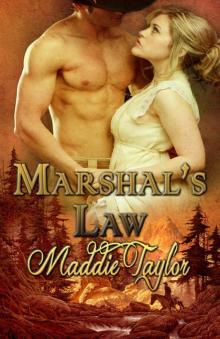 Marshal's Law
Marshal's Law Claimed by the Warlord
Claimed by the Warlord Dare to Love Again
Dare to Love Again Bound by Fate
Bound by Fate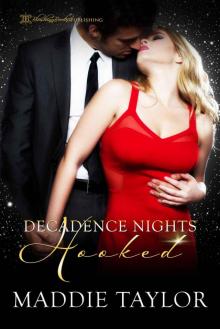 Hooked (Decadence Nights Book 1)
Hooked (Decadence Nights Book 1) The Barbarian's Captive
The Barbarian's Captive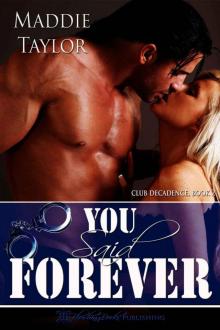 You Said Forever (Club Decadence)
You Said Forever (Club Decadence)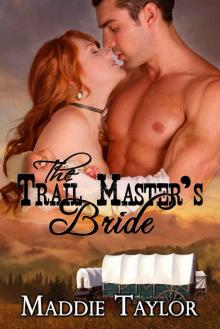 The Trail Master's Bride
The Trail Master's Bride The Renegades' Reward
The Renegades' Reward Wild Wisteria
Wild Wisteria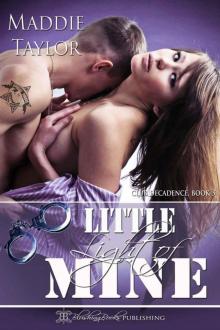 Little Light of Mine (Club Decadence)
Little Light of Mine (Club Decadence) Defying the General (Primarian Mates Book 4)
Defying the General (Primarian Mates Book 4)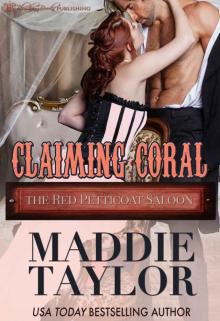 Claiming Coral (The Red Petticoat Saloon)
Claiming Coral (The Red Petticoat Saloon)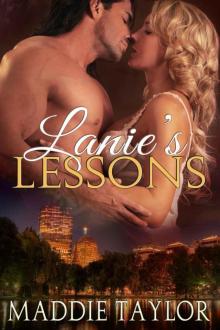 Lanie's Lessons
Lanie's Lessons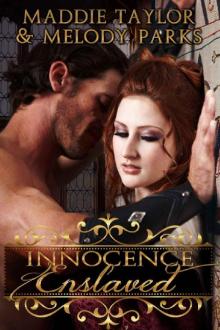 Innocence Enslaved
Innocence Enslaved His By Command (Primarian Mates Book 2)
His By Command (Primarian Mates Book 2) Second Time Lucky (Club Decadence Book 5)
Second Time Lucky (Club Decadence Book 5) Surrender Your Grace
Surrender Your Grace Sweet Salvation
Sweet Salvation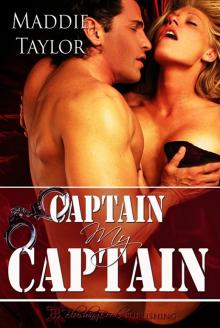 Captain, My Captain
Captain, My Captain Unbind My Heart (Club Decadence)
Unbind My Heart (Club Decadence) His Rebellious Mate (Primarian Mates Book 3)
His Rebellious Mate (Primarian Mates Book 3)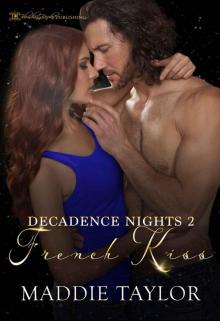 French Kiss (Decadence Nights Book 2)
French Kiss (Decadence Nights Book 2) Gideon's Redemption
Gideon's Redemption Defying the General
Defying the General Pleasure Bay
Pleasure Bay What About Love (Club Decadence Book 6)
What About Love (Club Decadence Book 6)